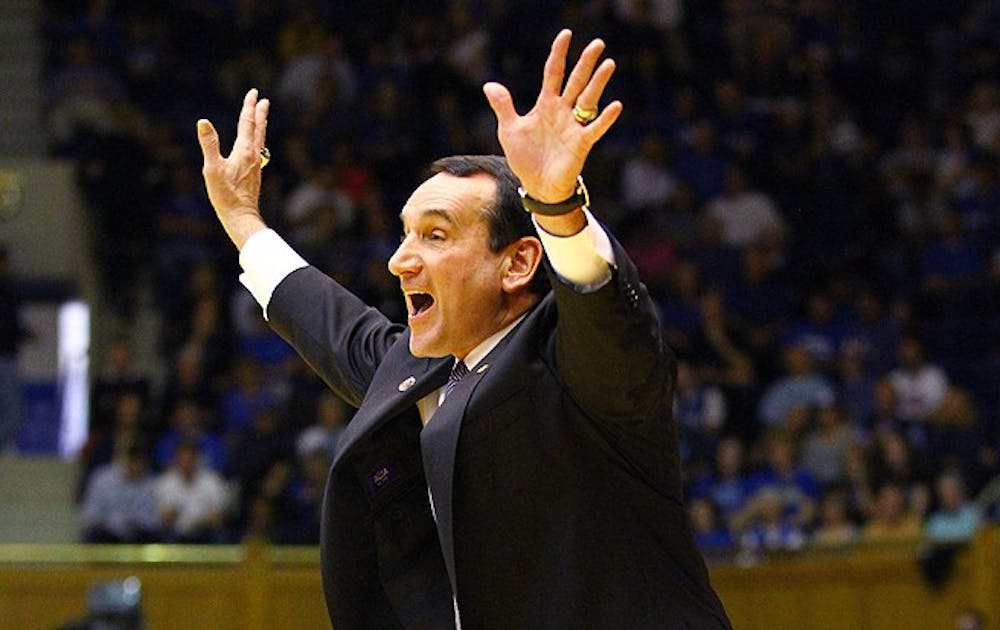The ACC/Big Ten Challenge annually produces some of the year’s best non-conference matchups, including this year’s 73-68 victory for No. 2 Duke against then-No. 4 Ohio State at Cameron Indoor Stadium.
But with Maryland leaving the ACC for the Big Ten as just one example of an increasingly-volatile conference realignment picture, will holding the challenge in the future be realistic? Duke head coach Mike Krzyzewski wondered just that on his GoDuke.com radio show with Bob Harris last week.
“The ACC/Big Ten—I wonder where that’s going to go. I don’t think we should do it anymore,” Krzyzewski said. “They’re taking teams from conference. We don’t even know who’s in all these conferences anymore. So, let’s just schedule our own games going forward.”
Among the chief concerns for the Blue Devils is juggling the realignment and its consequences with the desire maintain their own schedule flexibility.
“For instance in the ACC, we recently expanded from a 16-game to an 18-game conference schedule and with the ACC/Big 10 Challenge game already in place, that eliminates three games that the schools could schedule in the past,” Krzyzewski wrote in an email statement to The Chronicle Wednesday. “For years, Duke and other ACC schools have benefitted from scheduling strong national opponents. Certainly, college sports are based on tradition. We have to be careful not to lose that.”
The ACC/Big Ten Challenge is currently part of the television contracts both conferences have with ESPN, the company’s director of programming and acquisitions Nick Dawson said.
Although the full details of the television contracts are not publicly available, the ACC and ESPN announced an agreement in May 2012 that extended their television rights deal through the 2026-27 season. The Big Ten’s deal with ESPN, however, only runs through the 2016-17 season.
“From my perspective, people I’ve talked to in the two conferences and coaches, they both see a tremendous amount of value in the series,” Dawson said. “It’s one game on their schedule but it’s really become the landmark event for non-conference college basketball.”
But as conference expansion continues, scheduling becomes even more difficult for teams. Last year the Blue Devils were able to play St. John’s in late January, breaking up their ACC play with a non-conference game, something they had been able to do in years past. Because this is the first year ACC teams are playing an 18-game conference schedule, Duke has no such game on its calendar this year.
But the ACC/Big Ten Challenge is also a boon for the conference. It is often scheduled in the weekend leading up to the college football championship games, with the basketball contests featured in primetime on one of ESPN’s networks.
“We certainly hold some ideal real estate for it. And it is the one that gets the most attention nationally by college basketball followers and pundits,” said Karl Hicks, the ACC’s associate commissioner for men’s basketball. “ESPN has the right to a challenge series with us, and the Big Ten/ACC one has certainly been a successful one.”
Mike Cragg, a Duke senior associate athletic director who deals with much of the men’s basketball scheduling, echoed much of Krzyzewski’s sentiments about the program’s scheduling outlook. He said that with the reduced flexibility provided by the 18-game ACC schedule and by losing traditional rivals such as Maryland, the shifting athletic calendar will be something to keep a close eye on moving forward.
“Times change,” Cragg said. “I’m sure we’re not alone in feeling that.”
Get The Chronicle straight to your inbox
Signup for our weekly newsletter. Cancel at any time.

